The government of the capital city is currently working towards increasing accessibility to clean water, with a target of 100% by 2030. The construction of clean water pipelines is a key focus, with ongoing efforts to build pipes in areas that are currently not served by piped water. By expanding the pipeline system, the aim is to discourage people from pumping well water, which poses risks such as land subsidence. Residents like Yulia Mayau, who currently buy their clean water supply from neighbours, face high costs and limited access to water, with supply often running out quickly.
Yulia Mayau spends US$1.85 to fill an hour’s worth of water, which lasts her only three days. This leads to waiting times for refilling her supply, adding to the expense and inconvenience of obtaining clean water. The installation of pumps and networks by water service providers requires a minimum number of households to participate, which can be challenging in areas like Cilincing with frequent pump failures and congestion. Residents who sell their water to others without legal permission face fines, adding to the difficulties in accessing clean water for personal consumption.
Residents living within 80m of the sea are able to access a 2,000L water tank for their water needs, but leaks in the tank result in water running out faster than anticipated. This further complicates the situation for residents who rely on this source of water. The government is prioritizing the construction of clean water pipelines to address the challenges faced by residents who currently face high costs, limited access, and legal restrictions on obtaining clean water. By expanding the pipeline system and reducing reliance on well water, the aim is to improve accessibility to clean water for all residents in the city.
The initiative to increase accessibility to clean water aims to benefit residents like Yulia Mayau, who currently face challenges in obtaining clean water for their daily needs. The reliance on well water poses risks such as land subsidence, prompting the government to prioritize the construction of clean water pipelines. Efforts to expand the pipeline system will reduce costs, waiting times, and legal restrictions faced by residents who currently struggle to access clean water. By improving infrastructure and regulating water sources, the government aims to achieve 100% accessibility to clean water by 2030, benefiting all residents in the capital city.
The ongoing construction of clean water pipelines in Jakarta is part of the government’s efforts to increase accessibility to clean water for all residents. The aim is to deter reliance on well water, which poses risks such as land subsidence in certain areas. Residents like Yulia Mayau currently face high costs and limited access to clean water, with legal restrictions adding to the challenges of obtaining water for personal consumption. By expanding the pipeline system and addressing issues such as leaks in water tanks, the government aims to improve access to clean water and reduce the burden on residents who currently struggle to meet their water needs.
In conclusion, the government’s focus on building clean water pipelines is crucial in addressing the challenges faced by residents in obtaining clean water. Efforts to expand the pipeline system, reduce reliance on well water, and address issues such as leaks in water tanks will improve accessibility to clean water for all residents in the capital city. By prioritizing infrastructure development and regulation of water sources, the government aims to achieve its target of 100% clean water accessibility by 2030, benefiting residents like Yulia Mayau who currently face high costs and limited access to clean water for their daily needs.


